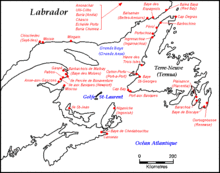lingvo.wikisort.org - Language
Algonquian–Basque pidgin, also known as Souriquois,[2] was a Basque-based pidgin spoken by Basque whalers and various Algonquian peoples.[1] It was spoken around the Gulf of Saint Lawrence. It was in use from at least 1580 until 1635,[2] and was last attested in 1711.[1]
This article may be expanded with text translated from the corresponding article in Basque. (July 2014) Click [show] for important translation instructions.
|
| Algonquian–Basque pidgin | |
|---|---|
| Region | Gulf of Saint Lawrence |
| Era | 16th to 18th century[1] |
Language family | Basque-based pidgin |
| Language codes | |
| ISO 639-3 | None (mis) |
| Glottolog | basq1252 |
 Basque (both French and Spanish) and Breton fishing sites in 16th and 17th centuries. | |
There were three groups of First Nations that the Basque people distinguished. The ones with which they had good relations were the Montagnais and the St. Lawrence Iroquoians. They also knew of the Inuit, whom they considered hostile. The Basque people referred to them as the Montaneses, the Canaleses, and the Esquimoas, respectively.[3]
Vocabulary
| Pidgin | Original language | English translation |
|---|---|---|
| Normandia | Normandia (Basque), 'Normandy' | French |
| kir | kir (Mi'kmaq) | you |
| ania | anaia (Basque) | brother |
| capitana | capitaina (Basque), kapitaina in Standard Basque | captain |
| endia | andia (Basque), handia in Standard Basque | large |
| chave | chave (Romance) | know |
| ouias | wiya:s (Innu-aimun) | meat |
| amiscou | amisku (Innu-aimun) | beaver |
Sample Phrases
| Algonquian-Basque pidgin | Basque | English |
|---|---|---|
| Ania, kir capitana? | Anaia, capitana al zara? | Brother, are you a captain? |
| Ania capitana ouias amiscou. | Anaia capitana kastor haragia. | Brother captain beaver's meat. |
| Endia chave Normandia. | Frantsesek gauza asko dakite. | The French know a lot of things. |
| Gara gara ender-quir gara gara. | Guda izango dugu. | There will be war if we continue like this. |
| Maloes mercatora. | Malo Deunakoak merkatari bidegabekoak dira. | Those of Saint-Malo are unfair traders. |
| Nola zaude? Apezak obeto. | Nola zaude? Apaizak hobeto. | How are you? The priests are better. |
See also
References
- Bakker, Peter (1989). "'The Language of the Coast Tribes is Half Basque': A Basque-American Indian Pidgin in Use between Europeans and Native Americans in North America, ca. 1540-ca. 1640". Anthropological Linguistics. 31 (3/4): 117–147. JSTOR 30027995.
- Mithun, Marianne (7 June 2001). The Languages of Native North America. Cambridge University Press. p. VII. ISBN 9781107392809.
- Echoes from the Past
- Gray, Edward (2000). The Language Encounter in the Americas, 1492-1800. Berghahn Books. pp. 342. ISBN 9781571812100.
The Language Encounter in the Americas, 1492-1800: A Collection of Essays.
Further reading
- Koldo Mitxelena (1984): "Lingüística inmanente y lingüística trascendente", "Julio Urquijo" Euskal Filologiaren Seminoarioaren Urtekaria, 18, 251–266. orr, Donostia, Gipuzkoako Foru Aldundia.
- Peter Bakker (1989): "The language of the coast tribes is half basque", Anthropological linguistics 31: 117–147. orr.
На других языках
- [en] Algonquian–Basque pidgin
[es] Pidgin vasco-algonquino
El pidgin vasco-algonquino o algonquino-vasco fue un pidgin usado por las tribus micmac, montagnais y posiblemente alguna otra tribu y por los balleneros vascos como medio de comunicación. Más tarde, los balleneros franceses que iban a las costas de Terranova y Labrador a cazar ballenas y comerciar con pieles también lo utilizaron.[fr] Basco-algonquin
Le basco-algonquin était un pidgin parlé par des baleiniers basques et les tribus de langues algonquiennes tels que les Micmacs[1], les Montagnais et les Inuits du Labrador dans la région du détroit de Belle-Isle et le Nord du golfe du Saint-Laurent vers l'océan Atlantique.[it] Pidgin basco-algonquino
Il pidgin basco-algonquino (in basco Euskoalgonkina algonkin-euskara pidgina o euskara-algonkin pigdina) era un pidgin usato da Míkmaq, Innu e altri amerindi di Terranova e Labrador entrati in contatto coi balenieri dei Paesi Baschi e baschi stessi. Nacque come lingua creola a seguito dell'arrivo nel nuovo mondo di balenieri, pescatori e mercanti baschi e gli abitanti amerindi delle coste orientali dell'America Settentrionale nel XVI secolo.[ru] Алгонкинско-баскский пиджин
Алгонкинско-баскский диалект — пиджин, на котором говорили баскские китобои и различные алгонкинские народы[1]. На нём говорили в районе реки Св. Лаврентия. Последнее свидетельство этого языка датируется 1710 г.[1]Текст в блоке "Читать" взят с сайта "Википедия" и доступен по лицензии Creative Commons Attribution-ShareAlike; в отдельных случаях могут действовать дополнительные условия.
Другой контент может иметь иную лицензию. Перед использованием материалов сайта WikiSort.org внимательно изучите правила лицензирования конкретных элементов наполнения сайта.
Другой контент может иметь иную лицензию. Перед использованием материалов сайта WikiSort.org внимательно изучите правила лицензирования конкретных элементов наполнения сайта.
2019-2025
WikiSort.org - проект по пересортировке и дополнению контента Википедии
WikiSort.org - проект по пересортировке и дополнению контента Википедии